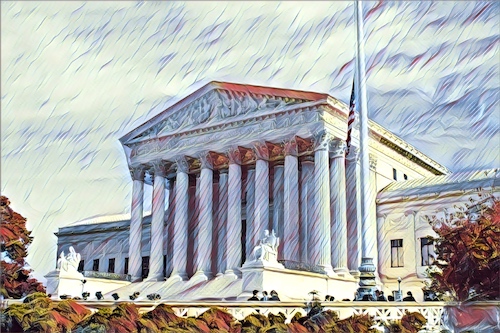“Amici Curiae supporting Public.Resource.Org fear that if the Supreme Court sides with the State of Georgia, those unwilling or unable to purchase a subscription may be denied access to the state’s own explanation and analysis of the law in which the state’s citizens are expected to abide.”
 That an open government is inseparable from a free society is one of the basic tenets supporting American democracy. If people are to be ruled by laws, they have a fundamental right to access those laws. To that end, in 17 U.S.C. § 105, the U.S. Copyright Office makes clear that binding and official government edicts may not be copyrighted by the United States government. However, the Supreme Court has not addressed the issue as it pertains to state governments since a series of cases in the late 1800s.
That an open government is inseparable from a free society is one of the basic tenets supporting American democracy. If people are to be ruled by laws, they have a fundamental right to access those laws. To that end, in 17 U.S.C. § 105, the U.S. Copyright Office makes clear that binding and official government edicts may not be copyrighted by the United States government. However, the Supreme Court has not addressed the issue as it pertains to state governments since a series of cases in the late 1800s.
But are there limits to that access, or are there certain situations in which government edicts may, in fact, fall under the scope of copyright protection? The U.S. Supreme Court hopefully will provide some clarity on this issue when it hears the case Georgia, et al. v. Public.Resource.Org, Inc. in the upcoming term.
The Bait is Set
The dispute began when the State of Georgia (specifically, the Georgia Code Revision Commission, an arm of the General Assembly) contracted with the LexisNexis Group, a private company, to produce and publish an annotated version of the state’s legal code. This version includes citations to relevant cases, as well as analysis and opinions from the state’s Attorney General. Under the terms of the contract, the state claims copyright protection over the annotated text and grants LexisNexis exclusive publication rights.
The state continued to make a simple text version of the legal code available for free online. But the annotated edition is only available for purchase, presumably by attorneys, academic libraries, and other legal insiders. The annotated edition raised the ire of Public.Resource.Org, an open government watchdog group, which claims that charging money for the volume of edicts created a barrier to access for people who may not be able to afford a copy. The organization republished the annotated version on its own, baiting the state to respond.
The State of Georgia took the bait, suing Public.Resource.Org for copyright infringement. Attorneys for the state made the case that the annotated edition was not itself a legal edict, but simply a commentary on the law.
Courts Weigh In
The District Court for the Northern District of Georgia agreed with the State of Georgia and ruled that the annotated edition was eligible for copyright protection, and that Public.Resource.Org violated the state’s copyright by republishing the text without permission.
However, the Eleventh Circuit overturned that decision in October 2018. In a strongly worded rebuke, the three-judge panel stated that citizens have a right to “unfettered access to the legal edicts that govern their lives” and that even an annotated version of the state’s legal code is “inherently public domain material.”
The appeals court also found that “the annotations cast an undeniable, official shadow over how Georgia laws are interpreted and understood,” finding at least 11 state court cases in which the annotations had been cited as official guidance. In concluding that this annotated version embodies a legal edict, the Eleventh Circuit highlighted the Attorney General’s participation as one element in the analysis that indicated the formality of the document and its binding nature on Georgia residents.
The state then appealed to the Supreme Court, which granted certiorari on June 24.
What’s at Stake
Amici Curiae supporting Public.Resource.Org fear that if the Supreme Court sides with the State of Georgia, those unwilling or unable to purchase a LexisNexis subscription may be denied access to the state’s own explanation and analysis of the law in which the state’s citizens are expected to abide. They also point out that law students, legal educators, and practitioners of the law should have full access to the state’s interpretation of the law, and that limiting such access impairs the very practice of law.
On the other hand, a ruling in favor of Public.Resource.Org may chill commercial efforts at elaborating on and clarifying the law in a manner that could prove detrimental to public understanding of the law. The State of Georgia and its supporters argue that the annotations do not themselves have the force of law but are provided as a valuable service that gives context to the law, for which copyright protection is appropriate. Georgia government officials say the arrangement allows them to create annotated texts in a cost-effective manner, and that their ability to copyright the annotations prevents unsolicited third parties from publishing incorrect statutory language that may ultimately harm Georgia citizens.
The Supreme Court last addressed the question of copyrightability of governmental works in 1888, when it clarified that state court judges speak for the people, such that their opinions are not copyrightable. We can expect a modern interpretation of what constitutes an edict of government sometime in the next term, after the Court reconvenes later this fall.
This article was updated on August 22 to clarify certain facts of the case, in response to comments that have since been deleted.

![[IPWatchdog Logo]](https://ipwatchdog.com/wp-content/themes/IPWatchdog%20-%202023/assets/images/temp/logo-small@2x.png)

![[Advertisement]](https://ipwatchdog.com/wp-content/uploads/2024/04/UnitedLex-May-2-2024-sidebar-700x500-1.jpg)
![[Advertisement]](https://ipwatchdog.com/wp-content/uploads/2024/04/Artificial-Intelligence-2024-REPLAY-sidebar-700x500-corrected.jpg)
![[Advertisement]](https://ipwatchdog.com/wp-content/uploads/2024/04/Patent-Litigation-Masters-2024-sidebar-700x500-1.jpg)

![[Advertisement]](https://ipwatchdog.com/wp-content/uploads/2021/12/WEBINAR-336-x-280-px.png)
![[Advertisement]](https://ipwatchdog.com/wp-content/uploads/2021/12/2021-Patent-Practice-on-Demand-recorded-Feb-2021-336-x-280.jpg)
![[Advertisement]](https://ipwatchdog.com/wp-content/uploads/2021/12/Ad-4-The-Invent-Patent-System™.png)






Join the Discussion
No comments yet.